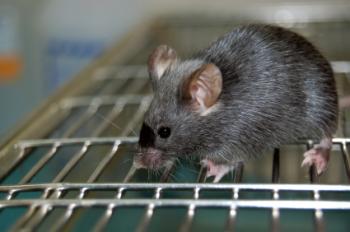More than 5 million people in the US have Alzheimer's disease, and this number is estimated to rise to 16 million by 2050. Such figures emphasize the importance of finding new treatments for the condition, and new research from Saint Louis University in Missouri could provide just that. In a mouse study, researchers were able to reverse symptoms of Alzheimer's using a newly created molecular compound.
The Saint Louis team, led by Susan Farr, PhD, a professor of geriatrics at the university, developed a compound called antisense oligonucleotide (OL-1). When tested on mouse models with Alzheimer's disease, they found the compound reversed classic symptoms of the disease - brain inflammation and learning and memory deficits.
The researchers explain that OL-1 works by blocking messenger RNA (mRNA) that stimulates the production of excess amyloid-beta protein, which can lead to the development of amyloid-beta plaques - a hallmark of Alzheimer's.
In detail, the compound was able to reduce the overexpression of the amyloid-beta protein precursor gene, which regulates the amount of amyloid-beta protein present in the body.
Compound tested on human amyloid-beta gene
To reach their findings, recently published in the Journal of Alzheimer's Disease, the team tested OL-1 on genetically engineered mice that overproduced a "mutant" form of the human amyloid-beta protein precursor gene.
They note that in a previous study, they had tested the compound on mice that naturally overproduced mouse amyloid-beta. Although this study was successful, the team wanted to test the compound on a human form of the gene to see if it was just as effective.

Researchers found that the OL-1 compound reversed symptoms of Alzheimer's - including learning and memory impairments - in mice.
The mice had high levels of the amyloid-beta protein, which increased inflammation in the brain and caused damaged to the hippocampus, leading to learning and memory impairments.
To serve as a comparison, the researchers tested a random antisense compound on healthy wild mice. Approximately half of the genetically engineered mice received the same antisense compound, while the other half received OL-1.
All mice were then subject to a series of experiments that measured learning, memory and appropriate behavior - such as recognizing an object, exploring an unfamiliar location and finding their way through a maze.
The team found that the genetically engineered mice who received OL-1 demonstrated improved learning and memory, compared with the genetically engineered mice that received the random antisense compound.
On comparing the effects of OL-1 in genetically engineered mice and the random antisense compound in wild mice, the researchers found no differences in learning and memory.
In addition, the researchers tested different injection sites of OL-1 on the mice, such as through the central nervous system so it entered the brain directly, and through a tail vein so it circulated the bloodstream. However, they found that injection site had no influence on outcomes.
Commenting on the study results, Farr says:
"Our findings reinforce the importance of amyloid-beta protein in the Alzheimer's disease process. They suggest that an antisense that targets the precursor to amyloid-beta protein is a potential therapy to explore to reversing symptoms of Alzheimer's disease."
This is the latest in a line of studies to look into potential treatments for Alzheimer's. Medical News Today recently reported on a study published in Nature Chemical Biology, which suggested that a novel class of compounds called "pharmacologic chaperones" couldsignificantly reduce amyloid-beta levels in Alzheimer's patients.
Recent research from Ohio State University found that caring for horses may ease symptoms of Alzheimer's, while a study from the Washington University School of Medicine in St. Louis, MO, and the University of Pennsylvania suggested that Alzheimer's onset could be slowed with a commonly prescribed antidepressant.
Copyright: Medical News Today
Not to be reproduced without the permission of Medical News Today.
Not to be reproduced without the permission of Medical News Today.

0 comments:
Post a Comment